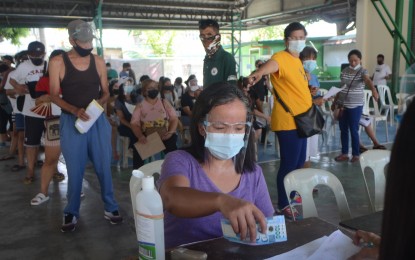
PNA file photo by Avito C. Dalan
MANILA – A party-list lawmaker on Thursday said the subsidies and cash assistance for poor Filipino families under the 2023 national budget would help cushion the impact of inflation as it accelerated to its fastest pace in 14 years in December.
Bagong Henerasyon Party-list Rep. Bernadette Herrera appealed to government agencies in-charge to disburse most of these funds before the spending ban that will come with the Barangay and Sangguniang Kabataan (SK) elections in October this year.
"Releasing these funds will cushion the impact of inflation not just for the poor and low-income families, but also for the small businesses they work for and interact with," Herrera said.
Last December’s inflation rate was within the Bangko Sentral ng Pilipinas’ (BSP) 7.8 to 8.6 percent forecast for the month and brought the average inflation last year to 5.8 percent, way beyond the government’s 2 to 4 percent target band.
Herrera warned that the "elevated inflation" will erode the purchasing power of the entire 2023 budget.
She said that if inflation stays high above 7 percent monthly, that would mean the newly-enacted 2023 budget would lose about 7 percent of its purchasing power or by about PHP368 billion.
"Hindi barya ang PHP368 billion sa nabawas na halaga na kayang bilhin ng national budget. Malaking bagay iyan dahil sa tantya ng BSP, mananatiling mataas ang inflation sa kabuuan ng 2023 (PHP368 billion is not chump change, which is the amount of purchasing power to be lost from the national budget. That is a big deal, because based on BSP estimates, inflation would remain high for the entirety of 2023)," she added.
The Department of Budget and Management (DBM) earlier said it has allocated over PHP200 billion of “ayuda” in the form of cash transfers and subsidy programs under the 2023 national budget.
Herrera cited the central bank stating that the “upside risks continue to dominate the inflation outlook up to 2023 while remaining broadly balanced in 2024".
According to BSP, the expected upside risks to inflation over the policy horizon stem mainly from elevated international food prices due to high fertilizer prices and supply chain constraints.
“On the domestic front, trade restrictions, increased prices of fruits and vegetables due to weather disturbances, higher sugar prices, pending petitions for transport fare hikes, as well as potential wage adjustments in 2023 could push inflation upwards. Meanwhile, the impact of a weaker-than-expected global economic recovery continues to be the primary downside risk to the outlook,” the BSP also said.
The Philippine Statistics Authority (PSA) said the latest rate of increase of inflation figure is the fastest since November 2008 due mainly to the annual jumps in the food and energy prices. (PNA)
